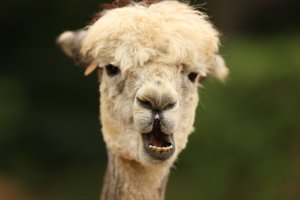Once upon a time, not so long ago, there were four alpacas – Butterscotch, Charcoal, Cusco, and Fiesta – living on our farm, somewhat peacefully. One day, three new alpacas came to live with us, and the peace was disturbed. We observed with bated breath as the alpacas worked out who would be the new alpha, the new leader of the pack. Sir William, one of the new ones, turned out to be the winner. We breathed a sigh of relief. Sir William was in charge and all seemed to be okay again in the alpaca world.
 Soon, however, we started noticing that Sir William was giving the alarm call more and more often. At first we thought he was taking good care of the herd and warning of impending danger. But really he was crying wolf. We realized Sir William was getting spooked by anything and everything – a duck from next door, our cat (who doesn’t even remotely look like a mountain lion), a fallen tree branch. And it was then that we put the pieces together … Sir William did not feel safe. His insecurity, his deep-seated alarm, was coming out as needing to take charge of his world. But he couldn’t keep himself safe. And he couldn’t afford to let his guard down. How exhausting Sir William’s life must have been! Always on call, taking matters into his own hands (or hooves in this case), living in fear.
Soon, however, we started noticing that Sir William was giving the alarm call more and more often. At first we thought he was taking good care of the herd and warning of impending danger. But really he was crying wolf. We realized Sir William was getting spooked by anything and everything – a duck from next door, our cat (who doesn’t even remotely look like a mountain lion), a fallen tree branch. And it was then that we put the pieces together … Sir William did not feel safe. His insecurity, his deep-seated alarm, was coming out as needing to take charge of his world. But he couldn’t keep himself safe. And he couldn’t afford to let his guard down. How exhausting Sir William’s life must have been! Always on call, taking matters into his own hands (or hooves in this case), living in fear.
As the puzzle pieces came together we realized what Sir William actually needed – a llama! He needed someone to trump him, to say I’ve got your back. You can rest. I’ve got this covered. I will take care of you. Llamas, unlike their smaller and less bold cousins the alpacas, are often used as guard animals. They have a gentle, yet strong, presence that keeps predators at bay. The animals in their care are able to go on living – grazing, sleeping, exploring – without obsessing about their own safety. And poor Sir William was certainly obsessed.
Many of our children are in the same position as Sir William. Something in life has spooked them, alarmed their system – maybe being away too long from mom or dad, grandma dying, a sick sibling, starting school, even getting older. We don’t know what it was for Sir William, as he came to us at five years old. But we do know now that he was alarmed when he came. And because of his overactive alarm system, he moved to take charge of his world. As his brain tried to find the true source of the alarm, it landed on false threats all around him – random animals and inanimate objects.
For some of our children, we see this same phenomenon in their fears and phobias (that often make little sense to us) or their need for order. Some children may follow Sir William’s lead and take charge of their world. In the alpha mode, they make demands, they warn of threats, they lead their herd! But it doesn’t feel right – either for you as the adult in charge, or for them, because it is not the right mode for receiving care and, just like the alpaca, they cannot make themselves feel safe. In the alpha mode, there is no rest. And while the alpha role can offer much fulfillment through providing care and protection to those in our care, when out of sync, this same role can lead to elevated alarm, inhibition of feelings, and an inability to let down our guard. Many of our children live in this very place. They, too, could use a llama in their life!
What our children need is a generous invitation to rest in our presence. As they desperately move to take the steering wheel into their own hands, we can gently assure them that we’ve got this! We can provide the message that we are in control and we will take care of them. Not that there aren’t appropriate times for our children to be in the driver’s seat, but first they need to be able to depend on us. And we can help make it easier to depend by anticipating their needs and getting there first – with food, with contact and closeness, with emotion. We can provide a safe place to express the frustrations, the alarming feelings, the disappointments, the tears. For in making room for these experiences, we free children to be children. We free children to go on living – grazing, sleeping, exploring – without obsessing about their own safety.
For more about anxiety, consider enrolling in our five-week online course, Making Sense of Anxiety, which starts November 1st, 2016.
